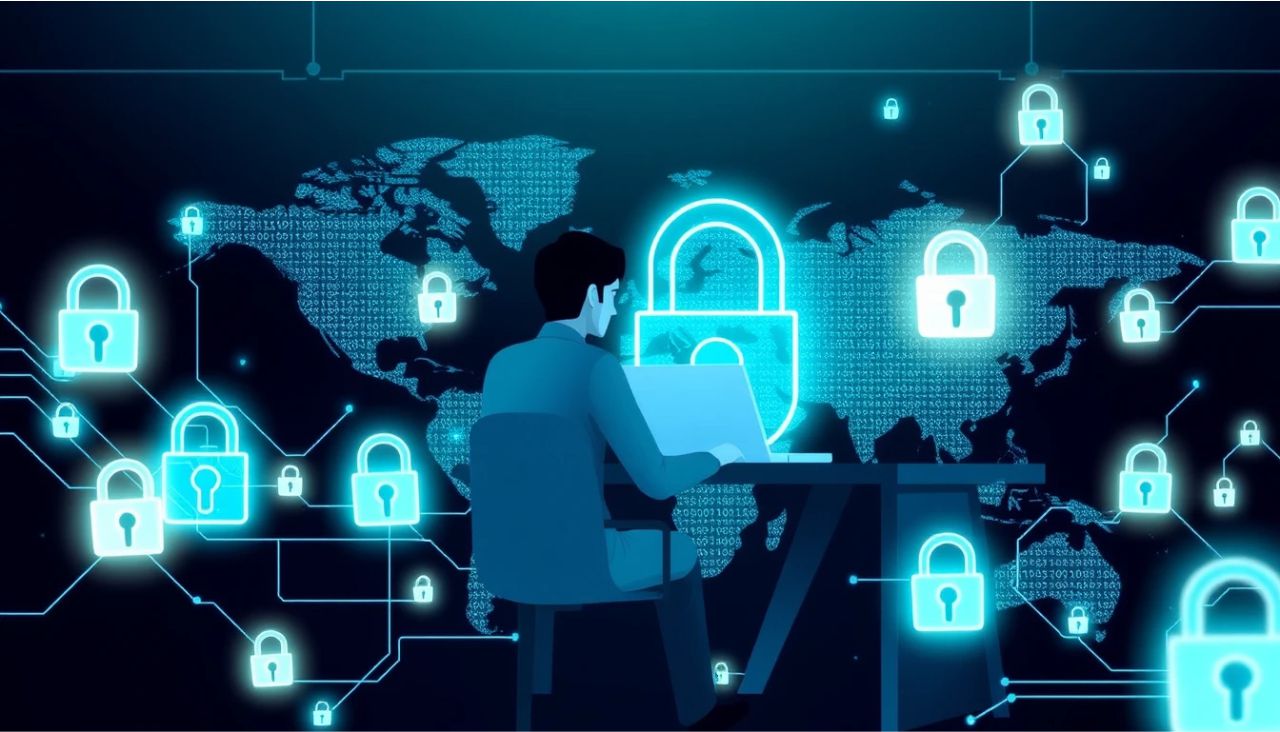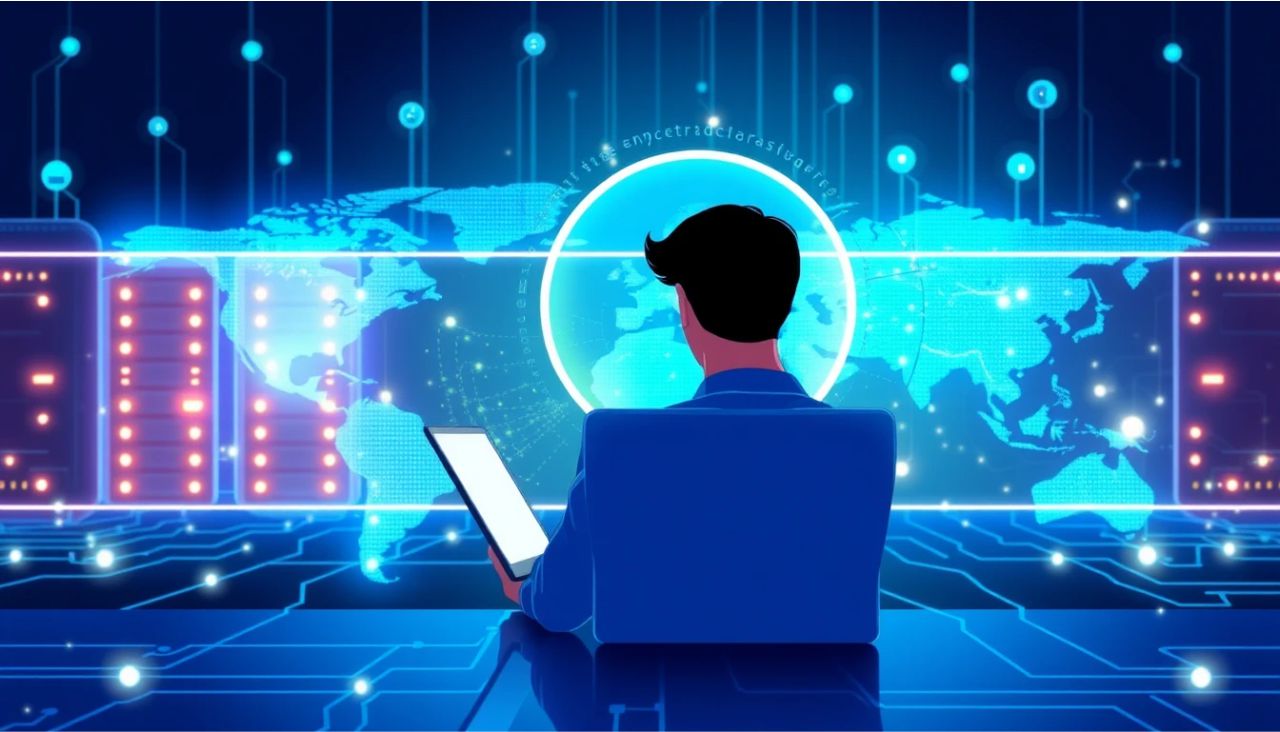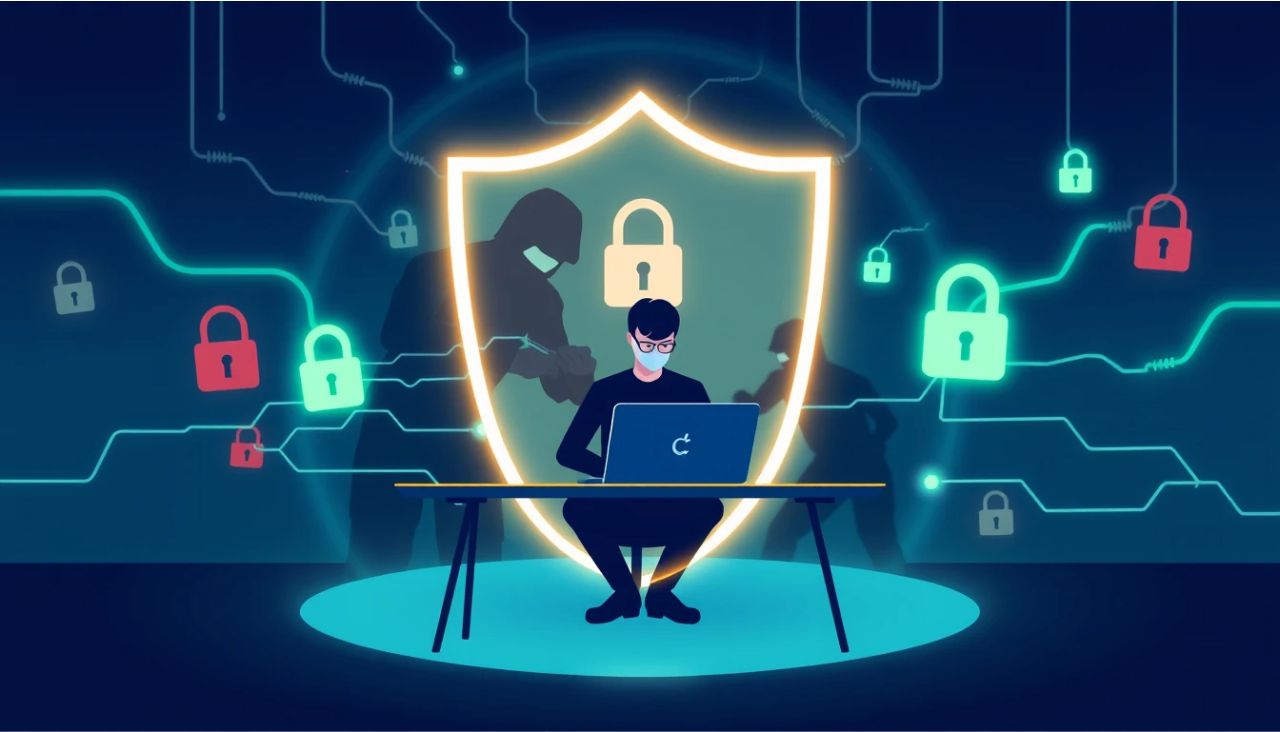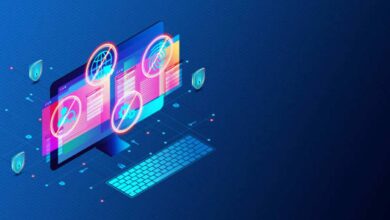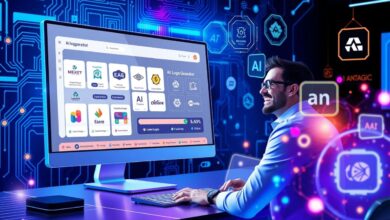7 Amazing VPN Facts to Protect Your Digital Privacy
Learn 7 powerful VPN facts that keep your data safe, boost privacy, and unlock geo-restricted content.
A VPN, or virtual private network, is like a secret tunnel for your internet. It keeps your online activities safe from prying eyes. In today’s digital world, where hackers and trackers are everywhere, using a VPN is one of the best internet privacy tools. It hides your IP address and encrypts your data, so you can browse safely.
Understanding VPN basics is essential for online security. It helps protect your personal information, like passwords and bank details. Plus, it gives you freedom by letting you access websites that might be blocked in your area. Think of a VPN as a digital superhero guarding your online life!
With so many benefits, learning about VPNs is a must. You’ll discover how they keep you safe, work on all devices, and even help you stay anonymous online. Whether you’re at home, at school, or using public Wi-Fi, a VPN can make your internet safer and more private.
Let’s dive into the top 7 VPN facts that everyone needs to know! You’ll see why this tool is a game-changer for protecting your digital life.
What is a VPN and How Does It Work?
A VPN, or Virtual Private Network, is like a secret tool for the internet. It keeps your online activities safe and private. Here’s how it works: when you use a VPN, it creates a private connection between your device and the internet. This connection is protected by something called VPN encryption.
Imagine sending a letter through a locked tunnel instead of a regular envelope. That’s how a VPN keeps your data safe. It scrambles, or encrypts, the information you send online, like your passwords or messages, so no one else can read it.
A VPN also hides your IP address, which is like your home address on the internet. By hiding it, the VPN makes it harder for hackers or websites to track what you do online. This helps you enjoy secure browsing without worrying about anyone spying on you.
VPNs are super useful if you want a private connection, especially on public Wi-Fi. They protect you from hackers who might try to steal your information. With a VPN, you can surf the web, shop, or stream videos without fear.
It’s amazing how such a small tool can do so much to keep you safe online!
Fact #1 – VPNs Protect Your Data from Hackers
Did you know that public Wi-Fi can be a playground for hackers? It’s true! About 25% of all cyberattacks happen on public networks. When you connect to Wi-Fi at a coffee shop, library, or airport, hackers can sneak into your device and steal your personal information. But don’t worry—a VPN can stop them in their tracks!
A VPN creates a private and secure connection between your device and the internet. It works like a shield, keeping hackers away from your sensitive data, like passwords and bank details. Even if a hacker tries to peek, the VPN encrypts your data, making it look like a scrambled puzzle.
For example, imagine someone trying to read your diary. Without a VPN, it’s like leaving your diary open on a table. But with a VPN, it’s like locking your diary in a safe!
So, whether you’re checking emails, shopping, or just browsing, a VPN keeps you safe on public Wi-Fi. It’s an easy way to protect your online life from cyberattacks.
Want to learn more about staying safe online? Check out our guide on cybersecurity for small businesses with best practices and tools for helpful tips and tools! Stay safe wherever you go!
Fact #2 – Not All VPNs Are Created Equal
All VPNs might seem the same, but they’re not! There’s a big difference between free and paid VPNs. Free VPNs sound great because they cost nothing, but they can come with hidden risks.
For example, many free VPNs sell your data to advertisers. This means your private information isn’t so private anymore. On the other hand, trusted VPN providers with premium plans follow strict no-log policies. This means they don’t store or share what you do online.
Paid VPNs are also much faster. Free VPNs often have slow speeds because too many people use them. Imagine trying to drink water from a tiny straw—it’s frustrating, right? That’s what using a free VPN can feel like.
With a premium VPN, you get better security, too. They use advanced tools to block hackers and protect your data. If you want a private and secure internet experience, choosing a paid VPN is the smarter choice.
So, when deciding between free vs. premium VPNs, think about what matters most—speed, security, and privacy. A little investment in a trusted VPN provider can make a big difference in keeping you safe online!
Fact #3 – VPNs Can Help Bypass Geo-Restrictions
Have you ever tried to watch your favorite show, only to find it’s not available in your country? That’s called a geo-restriction, and it can be frustrating. But don’t worry—a VPN can help!
A VPN allows you to access content that’s blocked in your location. It does this by changing your virtual location. For example, if you’re traveling abroad and want to watch shows from your home country, a VPN can make it look like you’re still at home. Suddenly, those streaming services work perfectly!
Think of it like having a magic key that opens doors to different parts of the internet. With a VPN, you can unblock Netflix libraries, visit restricted websites, or stream live events that aren’t available where you are.
This is especially helpful for travelers. Imagine someone visiting another country but missing their favorite TV series. By using a VPN, they can easily access their home country’s streaming services and feel connected to home.
VPNs make the internet more open and fun! Want to learn how to unblock Netflix with a VPN? Check out our guide on unblocking Netflix with a VPN and start exploring the world of unlimited entertainment!
Fact #4 – VPNs Can Boost Online Anonymity
When you browse the internet, websites and advertisers can see your IP address. Think of it as your home address on the web. This means they know where you are and can track what you do online. But don’t worry—a VPN can keep you hidden!
A VPN masks your IP address by replacing it with one from a different location. This makes it hard for anyone to figure out who you are or where you’re browsing from. It’s like wearing a disguise that keeps your identity safe.
This level of online anonymity is super important. Without it, companies can use your browsing habits to send you targeted ads. Even your internet service provider (ISP) can track your activity and collect your data. With a VPN, you stay private, and no one can snoop on you.
For example, imagine you’re shopping online for a gift. Without a VPN, you might start seeing ads for that gift everywhere! A VPN stops this by keeping your searches anonymous.
So, if you want to protect your identity and enjoy secure browsing, a VPN is a must-have. It’s an easy way to prevent ISP monitoring and stay private on the web!
Fact #5 – VPNs Can Slow Down Internet Speeds
Using a VPN can sometimes make your internet a little slower. Why? Because a VPN does extra work to keep you safe. It encrypts your data, like putting your messages into a secret code, and then sends it through a secure tunnel. This takes time.
Another reason is rerouting. Instead of going straight to a website, your data travels through a VPN server first. If the server is far away or busy, it can add a small delay. For example, using a VPN might reduce your speed by 5–10%, depending on the server you choose.
But don’t worry! There are ways to keep your connection fast. First, choose a server that’s close to your location. Nearby servers often work faster because your data doesn’t have to travel as far. Second, pick a VPN that uses faster protocols, like WireGuard. It’s designed to be quicker while still keeping you safe.
While a VPN might slow things down a little, the privacy and security it offers are worth it. Plus, with the right settings, you probably won’t even notice the difference! Stay safe and keep browsing confidently.
Fact #6 – VPNs Aren’t Just for Laptops
Did you know VPNs can work on more than just laptops? You can use a VPN on mobile phones, smart TVs, and even routers. This means you can stay safe and enjoy private browsing on almost any device you use.
On mobile devices like Android and iPhone, VPNs are super handy. They protect your data when you’re using public Wi-Fi or checking your emails on the go. You simply download an app, turn it on, and you’re secure.
Smart TVs can also use VPNs! If you love streaming shows or movies, a VPN helps unlock content from other countries. For example, you can access global Netflix libraries without leaving your couch.
And here’s something even cooler: you can set up a VPN on your router. This way, all the devices in your home, like gaming consoles or tablets, stay protected automatically. You won’t need to install separate apps for each one!
VPNs are compatible with many devices, making them a must-have for secure and private connections everywhere. Want to learn more about unlocking streaming content? Check out our guide on Unlock Global Content with Top Free VPN Features for Streaming.
Fact #7 – Some Countries Restrict VPN Usage
Did you know that not every country allows VPNs? In some places, like China, Russia, and North Korea, VPN usage is restricted or even banned. These countries have strict internet censorship laws. They try to control what people can see or do online.
But why would they do that? Some governments want to block certain websites or limit access to foreign information. They see VPNs as a tool that bypasses these controls.
If you’re traveling to a country with VPN restrictions, you need to be careful. Always check the local laws first. Using a VPN where it’s banned could lead to fines or other problems.
There are still ways to stay safe, though. Choose a trusted VPN provider that offers “stealth” modes. These can make your VPN look like regular internet traffic, so it’s harder to detect.
Remember, VPN legality varies from country to country. If you live in or visit a place with strict internet rules, stay informed and cautious. For more tips on navigating online restrictions, explore how VPNs protect your internet freedom!
FAQs About VPNs
What is a VPN, and how does it work?
A VPN (Virtual Private Network) is a tool that creates a secure, encrypted connection between your device and the internet. It works by routing your internet traffic through a private server, hiding your real IP address, and making your online activities anonymous. This ensures your data is protected from prying eyes, whether you’re browsing, streaming, or shopping online.
Why is using a VPN important for online security?
Using a VPN is crucial for safeguarding your personal information online. It encrypts your internet traffic, protecting sensitive data such as passwords, financial details, and browsing history from hackers, advertisers, and even your Internet Service Provider (ISP). This is especially important when using public Wi-Fi or accessing sensitive accounts.
How does a VPN protect your data from hackers, especially on public Wi-Fi?
When you connect to public Wi-Fi, your data can be intercepted by hackers using tools to access unsecured networks. A VPN encrypts your data, turning it into unreadable code that hackers cannot decipher. This keeps your personal information, such as bank details and login credentials, safe and secure.
What are the key differences between free and paid VPNs?
Free VPNs often have limited features, slower speeds, and data caps. They may also log your data or display ads to monetize their services. Paid VPNs, on the other hand, provide faster speeds, unlimited bandwidth, advanced security features, and a strict no-logs policy, ensuring your privacy and better overall performance.
How can a VPN help you bypass geo-restrictions and access blocked content?
A VPN allows you to connect to servers in different countries, making it appear as though you’re browsing from that location. This helps bypass geo-restrictions, giving you access to content, websites, and streaming services that may be unavailable in your region.
How does a VPN boost online anonymity by hiding your IP address?
Your IP address reveals your location and identity online. A VPN masks your IP address by assigning you a new one from its servers. This prevents websites, advertisers, and malicious entities from tracking your online activities, boosting your anonymity.
Why might using a VPN slow down your internet speed, and how can you minimize it?
Using a VPN can slow down your internet speed because your data is being encrypted and routed through a secure server, which adds extra steps to the process. To minimize this, choose a VPN server closer to your location, opt for a high-speed VPN provider, and avoid peak usage times.
Which devices are compatible with VPNs, and how can you set them up on smart TVs or routers?
VPNs are compatible with a wide range of devices, including smartphones, laptops, tablets, smart TVs, and routers. To set up a VPN on smart TVs or routers, you can either use VPN apps available for the device or configure the VPN settings directly on the router to protect all connected devices.
What are the risks and legal implications of using VPNs in countries with restrictions?
In some countries, using VPNs is restricted or illegal due to government policies. If caught, users may face fines or legal consequences. To stay safe, ensure you understand the local laws and use a trusted VPN provider that offers obfuscation features to bypass detection.
What are the benefits of using a VPN for streaming, shopping, and secure browsing?
A VPN enhances your streaming experience by bypassing geo-restrictions, allowing access to international content libraries. It secures your online shopping by encrypting payment details and protecting against fraud. Additionally, it ensures safe browsing by blocking malicious websites and ads, keeping your data private and secure.
Conclusion
VPNs are like magical shields for your online world. They protect your data, hide your identity, and keep hackers far away. With a VPN, you can browse safely, even on public Wi-Fi, and access websites without worrying about restrictions. These tools are super important for your online security and privacy.
We’ve explored how VPNs guard your personal information, let you unlock blocked content, and even work on phones and TVs. They’re not just for tech experts—they’re for everyone who wants a safer internet experience.
Now that you know the top VPN facts, it’s time to take the next step. Want to make your online world even safer? Check out our Cybersecurity Checklist for Your E-commerce Business. It’s packed with easy tips to protect your data and stay secure online. Remember, staying safe online isn’t just smart—it’s necessary!
